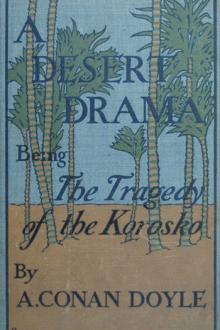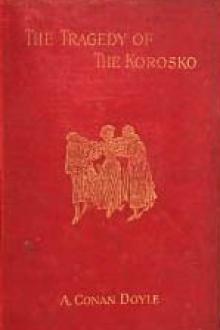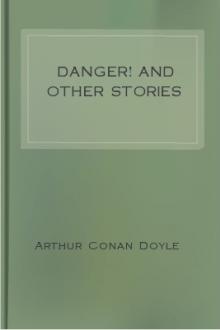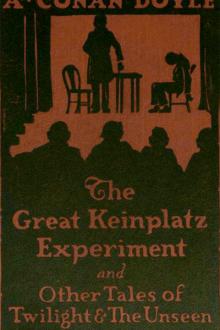author - "Arthur Conan Doyle"

"I understand, Captain Joyce," said the General, "that you have allowed a very important prisoner to slip through your fingers."
"I am sorry, sir."
"No doubt. But that will not mend matters. Did you ascertain anything about him before you lost him?"
"No, sir."
"How was that?"
"I could get nothing out of him, sir."
"Did you try?"
"Yes, sir; I did what I could."
"What did you do?"
"Well, sir, I threatened to use physical force."
"What did he say?"
"He said nothing."
"What was he like?"
"A tall man, sir. Rather a desperate character, I should think."
"Any way by which we could identify him?"
"A long black beard, sir. Grey eyes. And a nervous way of twitching his face."
"Well, Captain Joyce," said the General, in his stern, inflexible voice, "I cannot congratulate you upon your first exploit in the Egyptian army. You are aware that every English officer in this force is a picked man. I have the whole

osed to have been called so because it is a rock like a pulpit. When you have reached it you will know that you are on the very edge of civilisation, and that very little more will take you into the country of the Dervishes, which will be obvious to you at the top. Having passed the summit, you will perceive the full extremity of the second cataract, embracing wild natural beauties of the most dreadful variety. Here all very famous people carve their names,--and so you will carve your names also."
[Illustration: So you will carve your names also p26]
Mansoor waited expectantly for a titter, and bowed to it when it arrived. "You will then return to Wady Haifa, and there remain two hours to suspect (sp.) the Camel Corps, including the grooming of the beasts, and the bazaar before returning, so I wish you a very happy good-night." There was a gleam of his white teeth in the lamplight, and then his long, dark petticoats, his short English cover-coat, and his red tarboosh vanished successively down t

ctantly for a titter, and bowed to it when it arrived. "You will then return to Wady Halfa, and there remain two hours to suspect the Camel Corps, including the grooming of the beasts, and the bazaar before returning, so I wish you a very happy good-night."
There was a gleam of his white teeth in the lamplight, and then his long, dark petticoats, his short English cover-coat, and his red tarboosh vanished successively down the ladder. The low buzz of conversation which had been suspended by his coming broke out anew.
"I'm relying on you, Mr. Stephens, to tell me all about Abousir," said Miss Sadie Adams. "I do like to know what I am looking at right there at the time, and not six hours afterwards in my state-room. I haven't got Abou-Simbel and the wall pictures straight in my mind yet, though I saw them yesterday."
"I never hope to keep up with it," said her aunt. "When I am safe back in Commonwealth Avenue, and there's no dragoman to hustle me around, I'll have time to read about it all,

ople were blessed and shriven by the tremblingpriests. Outside no bird flew, and there came no rustling fromthe woods, nor any of the homely sounds of Nature. All was still,and nothing moved, save only the great cloud which rolled up andonward, with fold on fold from the black horizon. To the west wasthe light summer sky, to the east this brooding cloud-bank,creeping ever slowly across, until the last thin blue gleam fadedaway and the whole vast sweep of the heavens was one great leadenarch.
Then the rain began to fall. All day it rained, and all the nightand all the week and all the month, until folk had forgotten theblue heavens and the gleam of the sunshine. It was not heavy, butit was steady and cold and unceasing, so that the people wereweary of its hissing and its splashing, with the slow drip fromthe eaves. Always the same thick evil cloud flowed from east towest with the rain beneath it. None could see for more than abow-shot from their dwellings for the drifting veil of ther

and toAgatha, who was looking charming in white and pink,with glittering wheat-ears in her hair, when Wilsoncame twitching at my sleeve.
"You want something positive, Gilroy," said he, drawingme apart into a corner. "My dear fellow, I have aphenomenon--a phenomenon!"
I should have been more impressed had I not heard thesame before. His sanguine spirit turns every fire-flyinto a star.
"No possible question about the bona fides this time,"said he, in answer, perhaps, to some little gleam ofamusement in my eyes. "My wife has known her for manyyears. They both come from Trinidad, you know. MissPenclosa has only been in England a month or two, andknows no one outside the university circle, but Iassure you that the things she has told us suffice inthemselves to establish clairvoyance upon an absolutelyscientific basis. There is nothing like her, amateuror professional. Come and be introduced!"
I like none of these mystery-mongers, but the amateurleast of all. With the paid perfo

ed. We were at war.
There was no craft near us, and our surface speed is nearly twice that of our submerged, so I blew out the tanks and our whale-back came over the surface. All night we were steering south-west, making an average of eighteen knots. At about five in the morning, as I stood alone upon my tiny bridge, I saw, low down in the west, the scattered lights of the Norfolk coast. "Ah, Johnny, Johnny Bull," I said, as I looked at them, "you are going to have your lesson, and I am to be your master. It is I who have been chosen to teach you that one cannot live under artificial conditions and yet act as if they were natural ones. More foresight, Johnny, and less party politics--that is my lesson to you." And then I had a wave of pity, too, when I thought of those vast droves of helpless people, Yorkshire miners, Lancashire spinners, Birmingham metal-workers, the dockers and workers of London, over whose little homes I would bring the shadow of starvation. I seemed to see all those wasted eager ha

e eyes are the distinctive feature of his face. They are of the very darkest hazel, bright and eager, with a singular mixture of recklessness in their expression, and of something else which I have sometimes thought was more allied with horror than any other emotion. Generally the former predominated, but on occasions, and more particularly when he was thoughtfully inclined, the look of fear would spread and deepen until it imparted a new character to his whole countenance. It is at these times that he is most subject to tempestuous fits of anger, and he seems to be aware of it, for I have known him lock himself up so that no one might approach him until his dark hour was passed. He sleeps badly, and I have heard him shouting during the night, but his cabin is some little distance from mine, and I could never distinguish the words which he said.
This is one phase of his character, and the most disagreeable one. It is only through my close association with him, thrown together as we are day after day, t

d has been living there these fourteen years past.'
'A Polish nobleman?' I asked.
'Nay, we breed no such men in Poland,' he answered.
'A Frenchman, then?' cried Duroc.
'They say that he came from France.'
'And with red hair?'
'As red as a fox.'
'Yes, yes, it is my man,' cried my companion, quivering all over in his excitement. 'It is the hand of Providence which has led me here. Who can say that there is not justice in this world? Come, Monsieur Gerard, for I must see the men safely quartered before I can attend to this private matter.'
He spurred on his horse, and ten minutes later we were at the door of the inn of Arensdorf, where his men were to find their quarters for the night.
Well, all this was no affair of mine, and I could not imagine what the meaning of it might be. Rossel was still far off, but I determined to ride on for a few hours and take my chance of some wayside barn in which I could find shelter for Rataplan and myself. I had mou

ychical experiences which had befallen him. I at least was sound in nerve and brain, and it was with something of the pleasurable thrill of anticipation with which the sportsman takes his position beside the haunt of his game that I shut the laboratory door behind me, and partially undressing, lay down upon the rug-covered settee.
It was not an ideal atmosphere for a bedroom. The air was heavy with many chemical odours, that of methylated spirit predominating. Nor were the decorations of my chamber very sedative. The odious line of glass jars with their relics of disease and suffering stretched in front of my very eyes. There was no blind to the window, and a three-quarter moon streamed its white light into the room, tracing a silver square with filigree lattices upon the opposite wall. When I had extinguished my candle this one bright patch in the midst of the general gloom had certainly an eerie and discomposing aspect. A rigid and absolute silence reigned throughout the old house, so that the low sw

Governor in his Ramillies wig, his glasses, and his powdering-gown still seated sedately at the lonely table with his reeking pipe and six black bottles by his side.
"I have drunk with the Governor of St. Kitt's when he was sick," said he, "and God forbid that I should ever try to keep pace with him when he is well."
The voyage of the Morning Star was a successful one, and in about three weeks she was at the mouth of the British Channel. From the first day the infirm Governor had begun to recover his strength, and before they were half-way across the Atlantic he was, save only for his eyes, as well as any man upon the ship. Those who uphold the nourishing qualities of wine might point to him in triumph, for never a night passed that he did not repeat the performance of his first one. And yet he would be out upon deck in the early morning as fresh and brisk as the best of them, peering about with his weak eyes, and asking questions about the sails and the rigging, for he was anxious to l

"I understand, Captain Joyce," said the General, "that you have allowed a very important prisoner to slip through your fingers."
"I am sorry, sir."
"No doubt. But that will not mend matters. Did you ascertain anything about him before you lost him?"
"No, sir."
"How was that?"
"I could get nothing out of him, sir."
"Did you try?"
"Yes, sir; I did what I could."
"What did you do?"
"Well, sir, I threatened to use physical force."
"What did he say?"
"He said nothing."
"What was he like?"
"A tall man, sir. Rather a desperate character, I should think."
"Any way by which we could identify him?"
"A long black beard, sir. Grey eyes. And a nervous way of twitching his face."
"Well, Captain Joyce," said the General, in his stern, inflexible voice, "I cannot congratulate you upon your first exploit in the Egyptian army. You are aware that every English officer in this force is a picked man. I have the whole

osed to have been called so because it is a rock like a pulpit. When you have reached it you will know that you are on the very edge of civilisation, and that very little more will take you into the country of the Dervishes, which will be obvious to you at the top. Having passed the summit, you will perceive the full extremity of the second cataract, embracing wild natural beauties of the most dreadful variety. Here all very famous people carve their names,--and so you will carve your names also."
[Illustration: So you will carve your names also p26]
Mansoor waited expectantly for a titter, and bowed to it when it arrived. "You will then return to Wady Haifa, and there remain two hours to suspect (sp.) the Camel Corps, including the grooming of the beasts, and the bazaar before returning, so I wish you a very happy good-night." There was a gleam of his white teeth in the lamplight, and then his long, dark petticoats, his short English cover-coat, and his red tarboosh vanished successively down t

ctantly for a titter, and bowed to it when it arrived. "You will then return to Wady Halfa, and there remain two hours to suspect the Camel Corps, including the grooming of the beasts, and the bazaar before returning, so I wish you a very happy good-night."
There was a gleam of his white teeth in the lamplight, and then his long, dark petticoats, his short English cover-coat, and his red tarboosh vanished successively down the ladder. The low buzz of conversation which had been suspended by his coming broke out anew.
"I'm relying on you, Mr. Stephens, to tell me all about Abousir," said Miss Sadie Adams. "I do like to know what I am looking at right there at the time, and not six hours afterwards in my state-room. I haven't got Abou-Simbel and the wall pictures straight in my mind yet, though I saw them yesterday."
"I never hope to keep up with it," said her aunt. "When I am safe back in Commonwealth Avenue, and there's no dragoman to hustle me around, I'll have time to read about it all,

ople were blessed and shriven by the tremblingpriests. Outside no bird flew, and there came no rustling fromthe woods, nor any of the homely sounds of Nature. All was still,and nothing moved, save only the great cloud which rolled up andonward, with fold on fold from the black horizon. To the west wasthe light summer sky, to the east this brooding cloud-bank,creeping ever slowly across, until the last thin blue gleam fadedaway and the whole vast sweep of the heavens was one great leadenarch.
Then the rain began to fall. All day it rained, and all the nightand all the week and all the month, until folk had forgotten theblue heavens and the gleam of the sunshine. It was not heavy, butit was steady and cold and unceasing, so that the people wereweary of its hissing and its splashing, with the slow drip fromthe eaves. Always the same thick evil cloud flowed from east towest with the rain beneath it. None could see for more than abow-shot from their dwellings for the drifting veil of ther

and toAgatha, who was looking charming in white and pink,with glittering wheat-ears in her hair, when Wilsoncame twitching at my sleeve.
"You want something positive, Gilroy," said he, drawingme apart into a corner. "My dear fellow, I have aphenomenon--a phenomenon!"
I should have been more impressed had I not heard thesame before. His sanguine spirit turns every fire-flyinto a star.
"No possible question about the bona fides this time,"said he, in answer, perhaps, to some little gleam ofamusement in my eyes. "My wife has known her for manyyears. They both come from Trinidad, you know. MissPenclosa has only been in England a month or two, andknows no one outside the university circle, but Iassure you that the things she has told us suffice inthemselves to establish clairvoyance upon an absolutelyscientific basis. There is nothing like her, amateuror professional. Come and be introduced!"
I like none of these mystery-mongers, but the amateurleast of all. With the paid perfo

ed. We were at war.
There was no craft near us, and our surface speed is nearly twice that of our submerged, so I blew out the tanks and our whale-back came over the surface. All night we were steering south-west, making an average of eighteen knots. At about five in the morning, as I stood alone upon my tiny bridge, I saw, low down in the west, the scattered lights of the Norfolk coast. "Ah, Johnny, Johnny Bull," I said, as I looked at them, "you are going to have your lesson, and I am to be your master. It is I who have been chosen to teach you that one cannot live under artificial conditions and yet act as if they were natural ones. More foresight, Johnny, and less party politics--that is my lesson to you." And then I had a wave of pity, too, when I thought of those vast droves of helpless people, Yorkshire miners, Lancashire spinners, Birmingham metal-workers, the dockers and workers of London, over whose little homes I would bring the shadow of starvation. I seemed to see all those wasted eager ha

e eyes are the distinctive feature of his face. They are of the very darkest hazel, bright and eager, with a singular mixture of recklessness in their expression, and of something else which I have sometimes thought was more allied with horror than any other emotion. Generally the former predominated, but on occasions, and more particularly when he was thoughtfully inclined, the look of fear would spread and deepen until it imparted a new character to his whole countenance. It is at these times that he is most subject to tempestuous fits of anger, and he seems to be aware of it, for I have known him lock himself up so that no one might approach him until his dark hour was passed. He sleeps badly, and I have heard him shouting during the night, but his cabin is some little distance from mine, and I could never distinguish the words which he said.
This is one phase of his character, and the most disagreeable one. It is only through my close association with him, thrown together as we are day after day, t

d has been living there these fourteen years past.'
'A Polish nobleman?' I asked.
'Nay, we breed no such men in Poland,' he answered.
'A Frenchman, then?' cried Duroc.
'They say that he came from France.'
'And with red hair?'
'As red as a fox.'
'Yes, yes, it is my man,' cried my companion, quivering all over in his excitement. 'It is the hand of Providence which has led me here. Who can say that there is not justice in this world? Come, Monsieur Gerard, for I must see the men safely quartered before I can attend to this private matter.'
He spurred on his horse, and ten minutes later we were at the door of the inn of Arensdorf, where his men were to find their quarters for the night.
Well, all this was no affair of mine, and I could not imagine what the meaning of it might be. Rossel was still far off, but I determined to ride on for a few hours and take my chance of some wayside barn in which I could find shelter for Rataplan and myself. I had mou

ychical experiences which had befallen him. I at least was sound in nerve and brain, and it was with something of the pleasurable thrill of anticipation with which the sportsman takes his position beside the haunt of his game that I shut the laboratory door behind me, and partially undressing, lay down upon the rug-covered settee.
It was not an ideal atmosphere for a bedroom. The air was heavy with many chemical odours, that of methylated spirit predominating. Nor were the decorations of my chamber very sedative. The odious line of glass jars with their relics of disease and suffering stretched in front of my very eyes. There was no blind to the window, and a three-quarter moon streamed its white light into the room, tracing a silver square with filigree lattices upon the opposite wall. When I had extinguished my candle this one bright patch in the midst of the general gloom had certainly an eerie and discomposing aspect. A rigid and absolute silence reigned throughout the old house, so that the low sw

Governor in his Ramillies wig, his glasses, and his powdering-gown still seated sedately at the lonely table with his reeking pipe and six black bottles by his side.
"I have drunk with the Governor of St. Kitt's when he was sick," said he, "and God forbid that I should ever try to keep pace with him when he is well."
The voyage of the Morning Star was a successful one, and in about three weeks she was at the mouth of the British Channel. From the first day the infirm Governor had begun to recover his strength, and before they were half-way across the Atlantic he was, save only for his eyes, as well as any man upon the ship. Those who uphold the nourishing qualities of wine might point to him in triumph, for never a night passed that he did not repeat the performance of his first one. And yet he would be out upon deck in the early morning as fresh and brisk as the best of them, peering about with his weak eyes, and asking questions about the sails and the rigging, for he was anxious to l